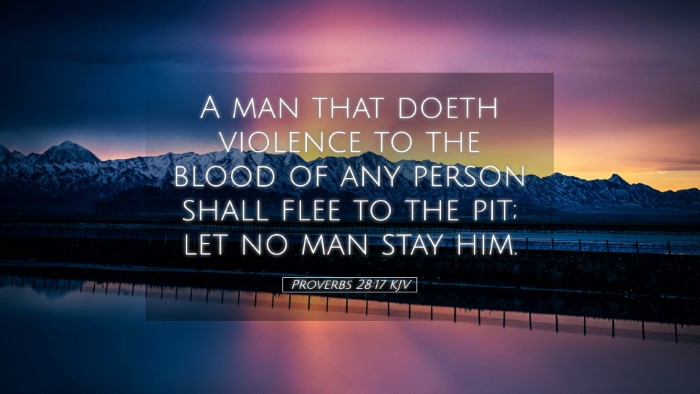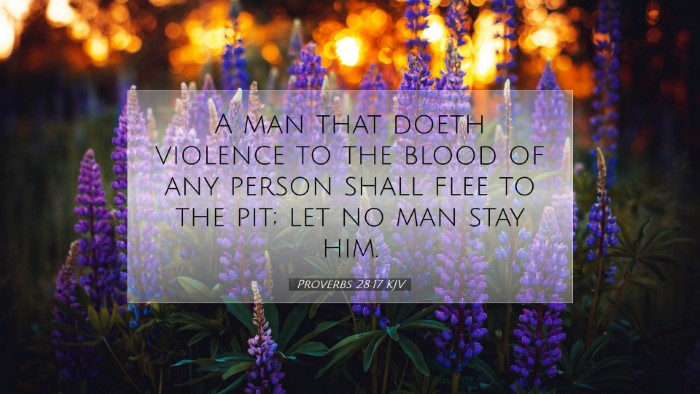Commentary on Proverbs 28:17
Proverbs 28:17 states: "A man that doeth violence to the blood of any person shall flee to the pit; let no man stay him." This verse speaks to the consequences of wrongdoing, particularly acts of violence, and delivers a stern warning about accountability before God.
Context and Understanding
This proverb fits within the larger context of wisdom literature, emphasizing moral integrity and the consequences of evil actions. The writer of Proverbs frequently contrasts the righteous with the wicked, elucidating the fate that awaits each group.
Insights from Matthew Henry
Matthew Henry highlights the severe retribution awaiting those who commit acts of violence, particularly against innocent blood. He emphasizes that such individuals may attempt to escape earthly consequences, yet they cannot flee from God's judgment:
- Violence and Guilt: Henry points out that engaging in violent acts leads to guilt and the need for a guilty conscience to seek refuge. The imagery of “the pit” illustrates the ultimate destruction that awaits the unrepentant.
- Moral Implications: He further stresses that no one should offer protection or support to someone who deliberately chooses violence. Such a person is already marked for destruction, making any attempts at intervention futile.
Insights from Albert Barnes
Albert Barnes offers a more applied perspective, discussing how this proverb serves as a warning to society against those who exacerbate violence:
- Consequences of Actions: Barnes emphasizes the idea that the one who commits violence—specifically against blood—will ultimately face destruction. He observes that such individuals can only escape temporarily but not ultimately.
- Judicial Exposition: He suggests the importance of justice, noting that societal structures should not protect or aid individuals who routinely commit violent acts, reflecting a broader mandate for justice within the community.
Insights from Adam Clarke
Adam Clarke provides a scholarly approach to interpreting this verse, bringing attention to the original Hebrew terminology and cultural contexts:
- Translation Nuances: Clarke examines the Hebrew phraseology, noting that it underscores the heinous nature of violence. He connects the term “blood” with guilt and transgression against God's laws.
- Spiritual Seriousness: Clarke also warns that unrepentant sinners cannot truly run from God, making it essential for one engaged in violence to seek redemption rather than flee.
The Theological Implications
In light of these commentaries, it becomes evident that Proverbs 28:17 carries profound theological implications:
- Accountability Before God: The verse acts as a reminder of divine justice, underscoring the necessity for accountability. Every individual is held responsible for their violent actions.
- Community Responsibility: There is an ethical exhortation for communities and leaders to maintain justice and not harbor or protect those participating in violence.
- The Importance of Repentance: The message encourages the sinner to repent rather than flee, highlighting God's readiness to forgive those who seek Him sincerely.
Conclusion
Proverbs 28:17 stands as a powerful testament to the consequences of violence and wrongdoing. By drawing insights from the commentaries of Matthew Henry, Albert Barnes, and Adam Clarke, contemporary readers can better understand the weight of this verse in both a historical and modern context. Pastors, students, theologians, and Bible scholars are reminded of the seriousness with which God treats acts of violence and the eternal ramifications that follow such actions.


